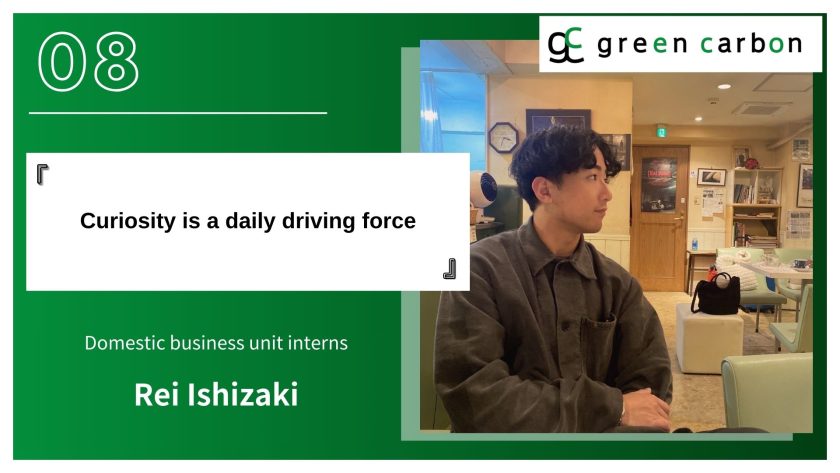We interviewed Rei Ishizaki, a fourth-year student at the Faculty of Agriculture, Kyushu University, who is involved in GreenCarbon as a student intern. Ms Ishizaki is participating as a student intern, but what does she have to say? Please read on until the end.
Q.Please give a brief introduction about yourself, including your school life so far
I have loved mountaineering and nature since I was a child, but when I read a book in high school and learnt about the current situation surrounding forests and forestry in Japan, I decided that I wanted to be involved in revitalising the Japanese forestry industry while protecting the mountains and nature I love so much. I entered the Faculty of Agriculture at Kyushu University in Fukuoka City from my home town of Kitakyushu City, where I am currently studying in the Global Forestry Science Course. In the Forest Policy Studies Laboratory, to which I belong, we study the relationship between forests and humankind historically, socially and economically, and we have daily discussions through seminars to elucidate measures to maintain and shape appropriate forest management.
On a personal note, I like music, drinking and curry, and I cherish every chance I get to meet new people and make friends with regular customers, such as hitchhiking from Fukuoka to Hokkaido, playing in Ohori Park, and going to snack bars on my travels alone. The lack of rest days is a recent problem (laughs).
Q.What made you decide to work for GreenCarbon?
In October of my third year, I was assigned to the Forest Policy Studies Laboratory to further specialise my studies. Through the seminars and classes, I experienced first-hand that after the adoption of the Paris Agreement at the 2015 Conference of the Parties to the United Nations Framework Convention on Climate Change (COP21), decarbonisation policies in various countries rapidly accelerated, and forests once again came to attract attention as a source of absorption and reduction of greenhouse gases, and I became interested in carbon credits in this context. Japan’s version of the carbon credit system, J-Credit, was launched in 2013 in Japan, but no one close to me was familiar with J-Credit, even though I wanted to deepen my understanding. I researched on the internet and found several environmental start-ups that provide support services for the creation of J-credits, so I contacted them all through the enquiry form on their websites.
One of the companies I contacted was GreenCarbon, where I am currently a long-term intern, and when I was given the opportunity to speak to them online, one of their employees said to me, ‘If you are that interested, why don’t you actually get involved as an intern?’ I agreed to the offer with a simple ‘yes’. That was kind of the start.
Q.What type of work are you involved in? Please tell us about your work
Most of the time, I work alone with employees of the Domestic Business Department.
In this context, I provide solutions, advice and implementation support to farmers, forestry cooperatives, companies and others, not only in relation to the J-credit system, but also in relation to various carbon neutral projects and consultations, through market analysis, competitive research and methodological adaptations.
Furthermore, when it comes time to proceed with the implementation of a project, I sometimes even help to assemble the blueprint of the project, including the schedule, necessary documents, price range of the equipment to be installed and the selection of monitoring methods. When I first started my internship, I was surprised that they would entrust me, a student, with so much work, and I remember being in agony because I had no idea where to start. In that sense, I really feel that I have acquired the ability to factorise and think about work while running on my own, such as identifying the tasks required to achieve the work while first carrying out the work in front of me (laughs).
Q.What makes your job worthwhile?
Most of the work we do at the beginning is completely unknown to us, but the moment when we can see even a small path to the goal as we work on it is very interesting and a very rewarding moment. The fact that the work I am involved in is unmistakably linked to the reduction of greenhouse gases is also the most rewarding and may be the source of the enthusiasm that flows out of me.
Q.What challenges have you faced so far?
There is no time during an internship when you are not facing challenges, and not in a good way (laughs).
First of all, activities in the decarbonisation area require knowledge in all areas, not only in primary industries such as agriculture, forestry, fisheries and livestock, but also in the energy sector, including renewable energy and energy saving, and even waste management, to name but a few. The tremendous scope of the sector is something that I always find very challenging. In addition, while sustainability and decarbonisation are current global trends, Japan is a latecomer compared to Europe and the US, and there are often no precedents when it comes to consulting on various ESG issues or applying the J-credit methodology. So we are meeting the challenges head-on with only the curiosity and excitement of taking on new challenges.
Q.Finally, do you have a message for those who want to work for GreenCarbon?
The market size and employment scale of the environmental industry is expected to continue to grow, and I feel every day that many people working in the environmental and energy fields are highly enthusiastic and approach their daily work with a challenging attitude. If you are interested in working with us, we would love to work with you!

